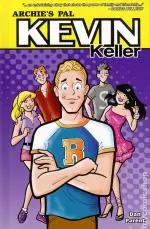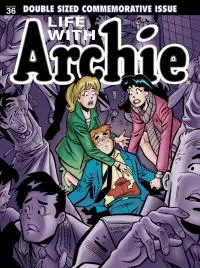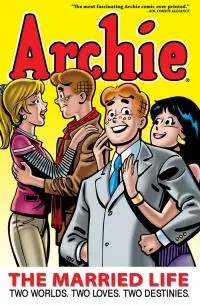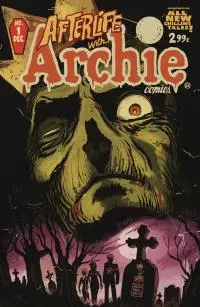Archie comics were never COMICS, comics to me. There was a significant lack of super powers. The characters spent very little time foiling schemes that could be described as "maniacal," "dastardly," or even good, old-fashioned "evil." I don't know that I ever saw Archie comics anywhere BUT the checkout aisle at the grocery store.
Archie books were, to put it in the parlance of the young boy I once was, for girls. In place of the powers and schemes and occasional science machine, Archie offered fashion, relationships, and a cleanliness I just didn't care for. Where comics of the 90's offered dark anti-heroes, Archie offered teens so squeaky clean that even a Punisher crossover couldn't dull their sheen.
As I've grown, so has my love for comics. I still read superhero stuff, but now there's room in my beefy heart for the emotional comics of a Jeffrey Brown or a Chris Ware, the hilarity of a Kate Beaton.
Events such as the announcement of an interesting new character and a zombified version of the Archie gang, combined with my broader tastes and deeper tolerance for comics that don't include fisticuffs, forced me to wonder: Is there maybe, just maybe, room for a gang of clean teens from Riverdale on a comic fan's reading list? Are Archie comics good? Is there something more going on than the will they/won't they shtick they've been running for decades?
The only thing for it was to put on my investigator's hat (which is actually a pair of sweatpants I read comics in) and see just what was going down in Riverdale.
Let's start with 'Archie's Pal Kevin Keller'
 Kevin Keller's arrival in Riverdale was a big story at the time. As an openly gay character in comics, Kevin was poised to set an example not only in Riverdale, but the larger world of popular entertainment.
Kevin Keller's arrival in Riverdale was a big story at the time. As an openly gay character in comics, Kevin was poised to set an example not only in Riverdale, but the larger world of popular entertainment.
The comics in this volume aren't all that great. Yes, they set up a pretty strong pro-tolerance stance, which is a good thing, but sadly they just aren't compelling, good comics. It's really too bad because they do some good work, but it's not enough to ignore the fact that the stories are a little disjointed. Oh, and there is another big problem with the idea.
It didn't occur to me until I'd read about half of this book and part of the next, but Riverdale, home of these teens, is a pretty sexless place. Archie LIKES Betty and Veronica, but it mostly ends there. Which is how it has to be. In a world with sex, Archie's indecision would come off as sleazy, or sleaziER depending on how you feel about it now. Not to mention that I can't help but think that in a world where sex was a real thing, it wouldn't take too many three-straw malt shop visits to broach the three-way option.
So in Kevin you have this character, and he's sold to us as gay. That's the part we're told to be excited about. The only thing is, if the character's sold to us on the basis of his preference for same-sex partners, something that cannot be acted on whatsoever because sex is not something that is acted on in this world, then it's like having a guy who is the world's greatest gunfighter in a comic book about adjusting insurance rates. In this volume, although he is 100% open about the fact that he's gay, the closest Kevin has to any sort of relationship with a man is a hamburger-eating contest with Jughead. He does say that he finds a couple of non-character characters cute, but that's the beginning and end of it. It's boring, although at least it's even in that the straight kids aren't having sex either.
I guess what I'm saying is, it feels a little like finding out a Teletubby is gay. Does that make any difference to the story? I mean, in whatever the hell kind of story Teletubbies are part of?
To answer my own question, perhaps. Because when you get down to it, this is sort of the crux of the equality argument. If Kevin Keller is sleeping with men or women or multiple women or Archie's parents on alternating Tuesdays, I really can't judge that. He's a nice, All-American boy who the other characters value in the same ways they value straight characters.
So maybe the failure of Kevin Keller, for me anyway, is that the story of a gay teen who lives in a throwback town and is accepted and happy...well, there's not a lot of conflict there, and though happiness is certainly what I would wish for any real human, it doesn't make for terribly compelling reading.
However, lack of conflict aside, this is where something started happening in Archie comics.
Kevin Keller's introduction exposes the fact that the writers are very aware of how their decisions in Riverdale are seen in our world, the real world. Indeed, Kevin's appearance is a much bigger deal in our world than in theirs. It's a much bigger deal precisely because the big effects of his orientation are felt in the real world, not the imagined world of Riverdale. Which is when things start to get interesting.
Kevin Keller's appearance is like the part in Terminator movies when they say the machines become sentient. Archie comics became self aware somewhere around this time. The writers knew what these comics were, they knew Riverdale was squeaky clean, and they managed to embrace that and push the boundaries at the same time. Kevin Keller showed that an openly gay character can fit into a setting that might seem unlikely, and he actually fits in seamlessly. It's a step towards what would become the first Archie comic I can wholeheartedly recommend.
![]() 'Archie: The Married Life'
'Archie: The Married Life'
Let's talk concept and then execution.
The concept here is that Archie: The Married Life is actually two series that run in parallel. Think of it as Earth 1 and Earth 2. On Earth 1, Archie proposes to Veronica, the rich girl who is ambitious and perhaps a little spoiled, but cares for Archie. On Earth 2, he proposes to Betty, the iconic girl next door.
The result is a series that tells two different stories. You get one issue where Archie has married Veronica, followed by an issue where Archie has married Betty. In the Veronica arc, Earth 1, Archie works for Veronica's billionaire dad, Veronica is his direct supervisor, and the couple remains in Riverdale. Betty is present, and she's in that fun, mid-20's tailspin of failure that so many of us have experienced.
On Earth 2, Archie marries Betty. The pair moves to New York where Betty pursues various jobs and Archie pursues his music career.
Now, on both Earths, the side characters have essentially the same plots. The Jughead stuff is the same, the Moose and Midge stuff. The only difference is, on Earth 1 Archie is with Veronica and working the corporate life, while on Earth 2 Archie is chasing a dream and he and Betty are basically broke.
The truly fascinating and unexpected thing about these comics is, it would seem that Archie...actually isn't happy in either scenario. Where I thought the comics would present Archie as a loving husband without a care in the world, basically doing the same stuff as always but with a tie and maybe a beard, the books have done a really nice job of dealing with a tough question: Is it better to pursue an artistic dream or a steady job?
I have to say, I was surprised at the way things shook out. It's not all Beach Boys surf songs with the top down anymore. It's darker. Like Beach Boys stuff that's not about surfing. Not about surfing one bit.
I'll also say that Veronica is pretty interesting in this version. She works for her father, and she has to make some really tough choices about siding with her dad or her husband. It's an inflated, soap opera version of a problem, but again it's a problem many of us know. You love your spouse, but my god it wouldn't be such a bad thing if their parents decided to study volcanoes and maybe got a little too excited about them and then maybe just fell in a volcano and that was that.
Betty is a bit more disappointing. They just haven't given her much to do early on in the story. She supports Archie financially, which is something, but early in the series she just doesn't have a lot going on.
Another mark in the win column at this point is the art. Less cheesecake, the female characters don't seem to be drawn with nearly as much fantasy sex appeal as they once were. The art has grown up in many ways. Somehow the artist has taken the Archie characters and made them look contemporary, but not by throwing Jughead in a leather jacket and Archie in skinny jeans. They just look...right. Grown up. Sort of like that kid from high school who looks older now, but still has the same face. Familiar, yet adult. The change in the art is a lot like the change I see in the books. It's different in tone, but it doesn't feel like it's different for shock value. It's different because that's the right way to tell these stories.
Yes, some of The Married Life is still very silly. It's dramatic, and it's very much a comic book. But I read comic books, and this is one I would read. One I DO read.
And if we're talking about life with Archie, it's hard not to talk about the recent announcement, the death of Archie.
 Yes, in issue #36 of Life With Archie, our hero is felled by a bullet meant for his aforementioned friend, Kevin Keller.
Yes, in issue #36 of Life With Archie, our hero is felled by a bullet meant for his aforementioned friend, Kevin Keller.
The death of a comic book character is rarely, if ever, permanent, and oftentimes it's nothing more than a plan to boost sales by tricking people who assume every comic book gains value if
A. Something happens, and
B. It is old.
I'll let you in on a comic book secret. SOMETHING happens in every comic, and EVERY comic will become old given time.
I'll let you in on another comic book secret, one regarding the death of characters. The only true death comes when a book is canceled and the character is phased out. You don't get foil covers, multiple variants, all that stuff. You just show up to pick up the next issue of Warriors Of Plasm and it's not at the comic shop. Or anywhere.
So this death is temporary, partial.
The third comic book secret I'll let you in on, one requirement of reading comics, is that you surrender yourself to the story, just a little, and trust the creators to take you for a ride.
I don't know where Archie's death will take the stories, and it's hard to say. But as a fan of the events that led up to this point and of the issue itself, I'm curious enough to see what waits for Archie in the great beyond. Which leads us to...
![]() 'Afterlife With Archie'
'Afterlife With Archie'
There are a couple ways to test if something has been mainstreamed enough that it's over. If Target sells shirts based on your favorite show, it's no longer an unknown entity. If commercials feature cheapened versions of whatever you're into, we're well into the danger zone. If something shows up in Riverdale, it may very well be over.
At least that's what I thought before I read Afterlife With Archie. Because let's face it, you can get Walking Dead in about 5 different comic book formats, on television, and even in side story novels. Not to mention the other zombie media out there. Books, comics, movies. Zombies were everywhere for a time, and it would seem that Archie and the gang got in on the action a bit late.
I can admit that the zombie market is saturated. And yet, I have to say, these are damn good comics.
They're fun, they're a good read, and they're very self-aware. At one point Archie even jokes about the fact that he wouldn't be able to decide between Betty and Veronica "even if he had fifty years." His mom gives him a hard time for his ride, a car that should've hit the scrap heap somewhere around VE Day. All the characters hint at just a bit of what's going on, the ultimate balance of a story that's aware of itself, yet not ashamed of what it is.
The writing is solid, the art is great, and just like Archie: The Married Life, the comic works because it's a good character study.
I wish there was a better way to say this, but I read this right before reading volume 21 of The Walking Dead. Archie was better. I felt more. I wanted to see what would happen. The characters were more fun to watch. I didn't feel (and I truly adore The Walking Dead, but it has to be said) that Archie was stretching out the story because they have to put off the ending.
You could spend a half hour in ways much worse than reading Afterlife With Archie, and the surprising part is I would count Walking Dead volume 21 as one of those ways.
I can't force anyone to read certain things. Especially comics. Comic fans can be, to put it in delicate terms, opinionated dorks who can rebel against change in a way that's powerful, frightening, and downright gross.
Which makes it all the more exciting to see Archie, of all characters, change so much.
The answer is Yes, you should read Archie. Read Archie: The Married Life. Read Afterlife With Archie too. Feel free to put on your skeptic's pants first. Mine are sweatpants that look suspiciously like my "investigator's hat" in that they are the same pants. Pants can be more than one thing.
Give Archie a shot. The creators have done some good things, and we're really still in the phase where it's not too late to jump on board, consider yourself an early adopter, and really criticize the bandwagoners who show up later. Which, final comic book secret of the day, is a super fun form of fandom.

About the author
Peter Derk lives, writes, and works in Colorado. Buy him a drink and he'll talk books all day. Buy him two and he'll be happy to tell you about the horrors of being responsible for a public restroom.
 'Archie: The Married Life'
'Archie: The Married Life'
 'Afterlife With Archie'
'Afterlife With Archie'








